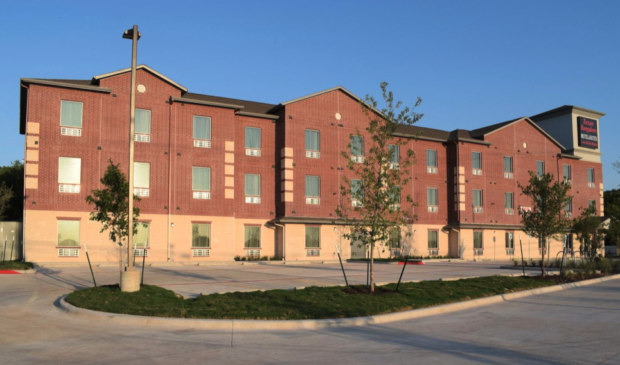The city expects to have about 175 new hotel rooms available by the end of June to provide permanent supportive housing to homeless people who are found to need long-term assistance to avoid winding up on the streets again.
During a presentation at Tuesday’s meeting of City Council’s Housing and Planning Committee, staff from the Housing and Planning Department gave an update on the purchase process for three hotels: Pecan Gardens, Bungalows at Century Park and Balcones Terrace. The three properties are moving through the process, with staff members securing vouchers to cover resident costs and working on rehabilitating the properties for permanent residents.
The hotels will be managed by Family Eldercare, Integral Care and Foundation Communities, with the units assigned to residents evaluated through the coordinated assessment program managed by ECHO, the Ending Community Homelessness Coalition. Units will be allocated based on need, with those who are found to have the most severe health or other issues receiving priority.
The new hotel shelters will be different from other recent hotel acquisitions the city has completed to address homelessness, with existing hotel/motel properties used as bridge housing for those who will likely be able to secure permanent housing with some assistance in two years or less.
During questioning from Council members, Dianna Grey, the city’s homeless strategy officer, said there is an ongoing search to purchase two additional hotels to use as bridge shelters, either of which could eventually be converted for use as permanent supportive housing.
“The distinction with bridge shelters is that we acknowledge there is a time-limited stop on the way to getting someone into permanent supportive housing,” she said. “One of the great things about the hotel strategy is that there is an opportunity in some cases to acquire a property and use it temporarily as that bridge shelter while we’re lining it up for permanent housing conversion.”
Council Member Kathie Tovo said she would like to see a financial analysis of the hotel strategy, with the city shouldering all of the costs, including paying service organizations for the assistance they provide to shelter residents. She said there may be value in looking at using multifamily apartment complexes for permanent housing and creating more congregate shelters for emergency housing situations rather than relying solely on acquiring hotels that could be costly to convert and may not be suited for permanent residents.
Grey and James May, acting housing and community development officer for the housing department, said apartment complexes can cost two or three times as much as hotel properties.
“It would be worth getting a sense of whether this is still the most cost-effective way to deliver bridge shelters,” Tovo said. “I don’t know if (hotels) are built in quite the same way and I know we’re doing renovations on them to help bring them into alignment with what we need for permanent supportive housing. But as we talk about costs and benefits, we need to evaluate if this is the most effective way to deliver the best level of services.”
Council Member Chito Vela expressed support for expanding the city’s portfolio of hotel properties, suggesting they could be redeveloped years down the road as the city’s homelessness issues are reduced.
“Ultimately it’s an asset the city holds indefinitely, and who knows what’s going to happen to those sites in the future. Maybe we can build affordable housing there once the need for helping unsheltered folks has dissipated.”
